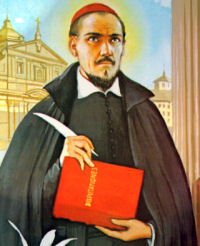St. Robert Bellarmine
St. Robert Bellarmine
 He was born at Montepulciano in Tuscany on October 4, 1542, the feast of the Poverello of Assisi toward whom he always cherished a special devotion. The day on which he died, September 17, is now the feast in honor of the stigmata of St. Francis.
He was born at Montepulciano in Tuscany on October 4, 1542, the feast of the Poverello of Assisi toward whom he always cherished a special devotion. The day on which he died, September 17, is now the feast in honor of the stigmata of St. Francis.
In 1560 Robert Bellarmine entered the Society of Jesus. He easily ranks among its greatest men, illustrious for learning as well as for piety, humility, and simplicity of heart. If it were possible to summarize his life in a single sentence, one that would resolve all the varied activities and accomplishments of his long career, a verse from the psalm might serve: “If I forget you, Jerusalem, may my right hand be forgotten.” His most important work was controversial in nature but the impact of his presentation “resembled the final chord in a mighty cantata, a chord that resounded through all the vice and scandal resulting from the internal corruption of the Church of that day, and that chord heralded Mother Church as one, holy, and Catholic” (E. Birminghaus).
Bellarmine also acted as confessor to the youthful Aloysius and John Berchmans. It might be asked why three hundred years passed before the beatification and canonization of Bellarmine. Long ago Bishop Hefele pointed to the reason when he wrote: “Bellarmine deserves the highest degree of respect from Catholics, even though he has not been canonized. Those who labored to besmirch him have only erected a monument of shame for themselves!” Finally in 1923, he was beatified; canonization followed in 1930, and on September 17, 1931, Pope Pius XI declared him a doctor of the Church.
Excerpted from The Church’s Year of Grace, Pius Parsch
Mass Readings September 17th. , 2020